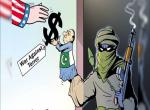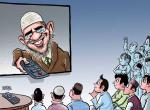International terrorism will not be wiped out with Osama bin Laden, who had long ceased to be its driving force
What is more important than Osama bin Laden’s elimination is the place where he was hiding. No remote mountain fastness concealed him from US intelligence. He lived comfortably, not far from Islamabad, in Abbotabad -- where a Pakistani military academy and a few regiments are located . To imagine that the Pakistani military leadership was oblivious of his whereabouts is to stretch belief beyond measure. This is of a piece with Pakistan’s record of duplicity, in both extending cooperation to the US in combating extremism, and withholding it in cynical calibration of Pakistan’s self-seeking interests.
The Pakistani leadership may have reasoned that aiding bin Laden’s capture or elimination might incite a stronger extremist backlash in the country. Already, the government is wary of taking on extremist forces on the blasphemy law issue. Pakistan’s military is subject to attacks by extremists; and sectarian strife in the country is deepening. In any case, bin Laden was no more a force on the ground, only a symbol of resistance to US imperialism. The Americans needed the catharsis of killing him, of feeling that justice for 9/11 had been rendered. Let us not forget that some of the key conspirators of 9/11 were Pakistanis.
The US operation raises many questions. Were the Pakistanis involved? If so, to what extent? On the Raymond Davis affair, the Pakistanis showed an acute sensitivity over sovereignty. In hindsight, it appears that episode may have had something to do with the bin Laden operation and the Pakistani fear of being exposed. Whatever the merits of rendering quick justice to bin Laden, it would appear that Pakistani sovereignty has been given short shrift. The operation took place deep inside Pakistani territory against an individual found on Pakistani soil by a foreign military force. Under what law was the individual’s body removed from the country without proper identification and autopsy?
Pakistan is a great stickler for its legal processes when it comes to trying those responsible for the Mumbai massacre, tirelessly citing the independence of its judiciary and so on. Yet here, it has dispensed with legal niceties and procedures, and bowed to US demands. This is less to criticize the procedure followed in bin Laden’s case, and more to highlight Pakistan’s obduracy in dealing with India’s legitimate demands.
The US cannot laud Pakistan too much for its role in eliminating bin Laden, because that would lead to questions regarding how much the Pakistanis knew about his hiding place. The Americans also have to be careful not to intensify domestic reaction against the government. They cannot pretend it was solely a US operation, as that would amount to violating Pakistani sovereignty with impunity. Barack Obama has played the Pakistani role in low key, merely stating he had spoken to Asif Ali Zardari, and hoping Pakistan’s cooperation in combating terrorism will continue.
Bin Laden’s death gives the American public much joy and the President some relief from the problems beleaguering him. But this is only a catharsis, not a solution to the problems the US faces in combating extremism in our region and worldwide. Bin Laden’s killing is not going to cow down those fighting the Americans in Afghanistan. The insurgency there was not his handiwork, but of the Pakistanis and their Taliban collaborators. Indeed, Pakistan continues to protect its Taliban assets in Afghanistan. It is Pakistan that the US has to tackle foremost.
Yet the US needs Pakistan as much now as before. Pakistan may now argue that after the bin Laden killing, and the likelihood of an intensified extremist backlash in the country, it is hardly in a position to act against the Haqqani network in North Waziristan. It will also beat the usual drum about getting relief on the eastern front with India under US auspices, its involvement in the reconciliation process, more economic and military aid, and a limited role for India in Afghanistan.
With Osama’s death, a chapter has been closed. But in recent years, the threat of international terrorism had no longer flowed from the role and personality of bin Laden. The Al Qaida and its affiliates have hatreds and grievances that are rooted in the perception that the West victimizes Islam. They believe in violence sanctified by their reading of the Koran. They have a mindset schooled in a particular reading of history.
This problem cannot be wiped out with bin Laden. The West has to show itself to be just and humane, and respectful of divergent views; less prone to dominate and use military force to get its way, and less vulnerable to charges of double standards. The bombing of Libya and the killing of Muammar Gaddafi’s grandchildren does not help in re-shaping attitudes. The Palestinian issue too has to be brought to a closure. The Arab world is in disarray, with uncertainties ahead, and Islamist forces are waiting behind the scene to capitalize on turmoil and frustration. There is a long battle ahead.
--------------------------------------------------
Published in Mint Dated: 2nd May, 2011









Post new comment